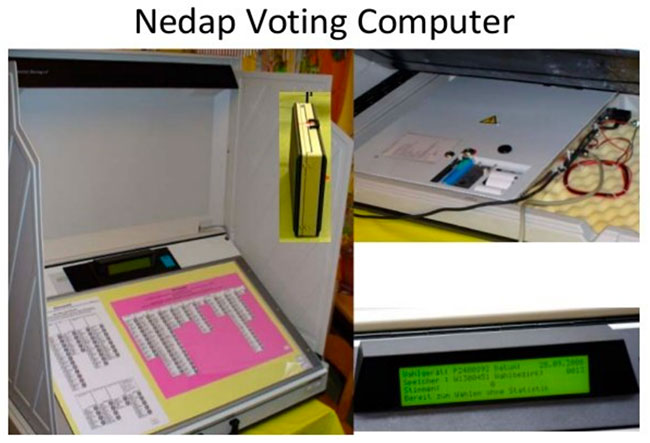Ireland and The Netherlands Ended Electronic Voting After Finding Machines Untrustworthy and Failed Security Requirements

Jim Hoft
TheGatewayPundit.com
The United States is not the only Western nation that has had issues with electronic voting.
In 2020 several states witnessed abnormalities, vote switching and inaccurate vote totals in the thousands.
A reader from the UK reminded us that Europe also had issues with voting machines and Ireland and The Netherlands banned voting machines a decade ago.
I am a reader from the UK and follow events in the USA with a great deal of interest. You may be interested to know that this was a common problem in Europe via Nedap voting machines whereby their security was compromised. Ireland purchased Nedap voting machines and subsequently destroyed them at a cost of £55 million due to security issues. I have attached a document to this email that explains this voting machine security issue that was faced by Europe and Ireland. I hope this information may be useful.
The Netherlands decided in 2007 to withdraw electronic NEDAP voting after after finding them unreliable and failed modern security requirements.
Case Study Report on Electronic Voting in the Netherlands
DECISION TO END ELECTRONIC VOTING
From the report:The government acted quickly in the wake of the release of the Commissions’ reports. During the press conference in which the Voting with Confidence report was released on September 27, 2007, the State Secretary for the Interior announced that the 1997 Regulation for Approval of Voting Machines would be withdrawn.
“We do not trust voting computers” had filed an administrative law procedure against the approval of NEDAP machines with the District Court of Amsterdam in March 2007. On October 1, 2007, the District Court decertified all NEDAP computers in use in the Netherlands as a result of the judicial procedure. With the approval of SDU voting machines already withdrawn, this decision left no voting machines certified for use in the Netherlands. On October 21, 2007, the 1997 Regulation for Approval of Voting Machines was officially withdrawn by Parliament, and the Decree of October 19, 1989 was amended, taking out the provisions that gave the minister responsibility for new regulations on approving voting machines. This legislative action removed the
possibility to certify any new voting machines.
Likewise in 2004 Ireland cancelled e-voting after finding the secrecy and accuracy of the voting could not be guaranteed.
Ireland has cancelled the use of electronic voting machines for the upcoming European elections in June after an independent commission said the secrecy and accuracy of the voting could not be guaranteed. The Irish government has spent 40 million euros on voting machines from the Dutch manufacturer Nedap. The Irish opposition demands the resignation of the responsible minister for the Environment and Local Government, Martin Cullen.
There has been a fierce public debate in Ireland about the introduction of e-voting after technical experts raised concerns on the reliability of the voting machines and its software. In 2002 the Irish security firm Zerflow reviewed the Nedap machines and concluded that manipulation of the voting process was possible. Experts and civil society groups have since then pushed for an independent review of the source code and the implementation of a paper trail (Voter Verified Audit Trail). The paper trail should make it possible for voters to see the result of their voting on paper as they can’t see what happens inside voting machines. The machine might display one vote to the voter and record something else internally. The paper ballot can also be used for a manual re-count if desired. The Nedap machines do not provide such a paper trail…
…The Irish debate has prompted Dutch members of parliament to ask questions about the reliability of the Nedap machines used in the Netherlands.





















